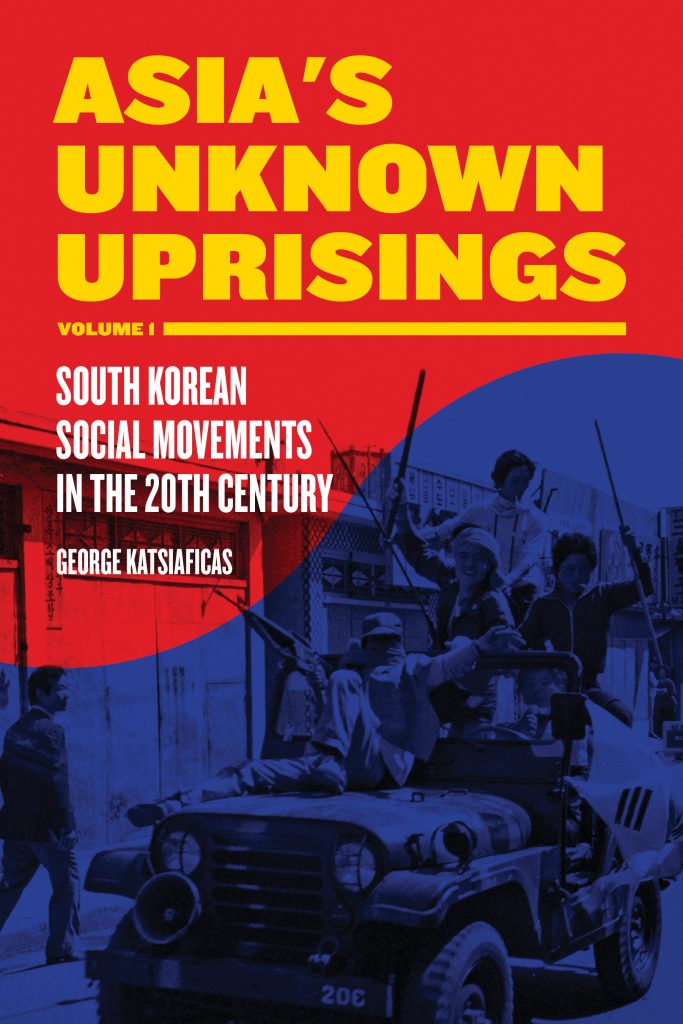by Rob Jacobs
Counterpunch
Weekend Edition, October 12-14, 2012
The history of the Korean people is one that includes decades of colonial oppression and subterfuge, war, and untold savageries in the execution of both. Some of the most brutal of said savagery was employed against the Korean people in the name of the United States and its fight against the Soviet Union. Simultaneously, Korea’s history is also filled with a legacy of resistance that makes most other such histories pale in comparison. Unfortunately, very little is known of this history in the west. Blame it on western arrogance or chalk it up as another symptom of the Orientalist discourse that determines too much intellectual and political opinion in the western hemisphere, the ignorance of this history is to the west’s detriment.
A recent book hopes to render some of that ignorance moot. Part of a two volume set, the first volume of George Katisaficas’ Asia’s Unknown Uprisings covers the social movements of southern Korea in the twentieth century. Katsiaficas, who has spent a good deal of time in Korea, is also the author and editor of several books on social movements, including The Imagination of the New Left: A Global Analysis of 1968 and The Subversion of Politics: European Autonomous Social Movements and the Decolonization of Everyday Life. Utilizing Marxist analysis, anarcho-syndicalist sympathies, and an on-the-ground understanding of how revolutionary social movements develop and flourish, Katsiaficas seems to have made his life’s work one of explaining these phenomenon so that others can apply the lessons he patiently explains. His latest work only adds to this endeavor.
For those unfamiliar with Korean history, Katsiaficas provides a quick overview. After discussing his historiographical approach that emphasizes the role social movements play in making history (as opposed to so-called great men), he guides the reader through the various Japanese occupations and colonization of the Korean peninsula. He provides a look at the opposition to that presence and how that opposition was either repressed or co-opted. The latter is a theme Katsiaficas returns to later in the text; especially when discussing the ability of modern capitalism to adapt to the demands of liberation movements without acceding control. This latter scenario should be all too familiar to U.S. readers, given the historical role played by U.S. mainstream political parties in doing exactly that.
After setting the context, Katsiaficas begins detailing the history of the Koreas after World War Two. Like the history of many colonized nations after that war, Korea’s is a history replete with betrayal and the domination of the nation by the very same forces the citizens thought they had thrown out when the Allies defeated Nazi Germany and Imperial Japan. Just like in the case of the Vietnamese, the defeat of Japan did not bring the end of outside rule or colonial oppression. Instead, the United States moved its forces into Korea and made the same right-wing Koreans that had collaborated with the Japanese oppressors the overseers of the U.S. occupation. Despite this, the existence of citizen’s committees that had formed during the war to fight against Japanese colonialism were able to maintain a fair amount of control in the early years after the war. As time went on, however, these forces were arrested, attacked, co-opted or exiled to northern Korea where the Soviet Union let them exist–even encouraged them. Then the Korean War erupted, which turned out to be one of humanity’s bloodiest conflicts, especially for the Korean people. It is estimated five million Koreans died, many of them in U.S. air raids and massacres by U.S. and southern Korean forces fighting with the US. The nation of Korea would never be the same. After three years of conflict, the hostilities ended with nothing truly settled. The southern half of the nation was ruled by a government that was essentially fascist. Koreans on either side of the 35th parallel (the line of separation determined by the UN Security Council at the request of Washington) could no longer visit relatives or friends on the other side. In short, the Korean people were in worse straits than before the bloodshed.
This is when Katsiaficas story truly begins. The story is a history full of people’s uprisings and protests; repression and successes. Told in a manner quite readable, Katisaficas spreads the history of Korea’s social movements across the pages of his text. The story told is not just a fascinating history. It is also full of lessons for those who fight for social change in their own countries. Foremost among these lessons is that change does not come overnight. Indeed, it might not come in the course of a generation. Yet, if a people continue to struggle for social and economic justice, the fruits of their efforts will eventually become real. This is crucial, especially in today’s world where people from all walks of life expect resolutions to happen as quickly as they do on television.
The first volume of Asia’s Unknown Uprisings is an important book. For too long, western historians, activists and students of history have focused mostly on their own histories. This has created a myopic vision and understanding that has limited historians’ ability to analyze their world and social justice activists’ ability to change it. This study has been a long time coming. The scholarship and pen of George Katsiaficas has made it worth the wait.
Ron Jacobs is the author of The Way the Wind Blew: a History of the Weather Underground and Short Order Frame Up. Jacobs’ essay on Big Bill Broonzy is featured in CounterPunch’s collection on music, art and sex, Serpents in the Garden. His collection of essays and other musings titled Tripping Through the American Night is now available and his new novel is The Co-Conspirator’s Tale. He is a contributor to Hopeless: Barack Obama and the Politics of Illusion, published by AK Press. He can be reached at: [email protected].







